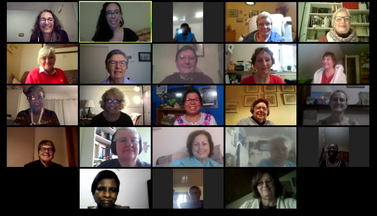 Let's Talk with WDP Vanuatu, Oct 23, 2020 Let's Talk with WDP Vanuatu, Oct 23, 2020 As preparations for the 2021 Vanuatu WDP celebration started in many countries, WDPIC held an online conversation with WDP Vanuatu on October 23, 2020. Across 7 regions, 26 participants from 13 WDP committees came to the "Let's talk with Vanuatu" meeting. The sisters in Vanuatu reflected on the 2021 theme "Build on a Strong Foundation" and informed on issues of child malnutrition, violence against women, the impact of COVID-19 on the islands and their plans for WDP 2021. Annette Poitier, WDP Bahamas, was invited to offer the opening prayer, to which she responded with appreciation for being part of a group that prays. In her prayer, she thanked all for being together from different time zones, and affirmed that we know that we are standing on a firm foundation when we are standing on prayer. “Build on a Strong Foundation, it is really an exciting theme. When we think about it, we automatically switch to our country motto ‘In God we stand’. Without God we can do nothing. Our country’s development after 40 years of independence reflects our belief that in God, we stand. In these uncertain times, the theme becomes very relevant to the world and to us. We hope that all will build their foundation on God alone, and then all things will be added,” affirmed Cindy Vanuaroro, from WDP Vanuatu. Through the country background information and the worship service’s prayers, we learned about some of the challenges in Vanuatu, to which Ruth Dovo, WDP Vanuatu, offered some updates. According to Ruth, Vanuatu is experiencing a double disaster: the COVID-19 pandemic and the aftermath of Category 5 Cyclone Harold that hit the islands in April 2020. The cyclone season is from October to March, and although the people are resilient and prepared for the season, sometimes the destruction is more than what was anticipated. Now, the communities affected are recovering thanks to the support of organizations and churches. Vanuatu is rich in natural resources like the fertile land and ocean, but some children may face malnutrition. This could be addressed with parental education, to help the families understand how to feed the children well. The COVID-19 pandemic has greatly impacted the tourism industry leaving many unemployed. All the frustrations caused by this economic situation can be seen in the rise of domestic violence. That being said, this situation has also created an opportunity for Vanuatu to go back to its agricultural roots. Now, everybody is farming and gardening because it is not known when the COVID-19 situation will be finished. People are encouraged to have their own gardens for their own consumption and for commercialization. When, Pollyanna Banga, WDP Vanuatu, last visited her home island, she got very excited. She comes from one of the islands where a volcano erupted and the people were evacuated. They are coming back and settling down, and women and young people are gardening. They started to plant again, and now they are harvesting the crop and living on that. “It is a good thing,” said Pollyanna joyfully. Ruth Dovo is grateful for the government task force’s response to COVID-19. One of the issues they dealt with was the repatriation of seasonal workers from Australia and New Zealand, who had to quarantine for 14 days. The policy may have contributed to Vanuatu being considered COVID-19 free, which is very important, as the medical facilities are too limited to deal with an outbreak. WDP committee representatives of Australia and New Zealand expressed their concern with the impact of the country’s closing borders to the seasonal workers from Vanuatu, whose families depend on them. In regards to plans for the celebrations in 2021, WDP Vanuatu created a working committee to organize several workshops for the empowerment of women, the worship service, a festive parade, and a big lunch with cultural performances. “Vanuatu is a Christian country,” continued Ruth, “so women in the church come to assist with prayers and support. We go through different challenges all the time, but we believe in God and know we are not alone. God is with us.” In the midst of the uncertainties, one thing we can say for sure, "we are covering Vanuatu in our prayers," concluded Janice Soyer-Delaney, from WDP Tobago. WDPIC thanks everyone who participated in the conversation, which was adjourned with Ruth reciting the Lord’s Prayer in her mother tongue from the Pentecost Island. Watch a video summary on our Youtube channel! - Rosângela S. Oliveira, WDPIC Executive Committee
3 Comments
 There is a long history of sisterhood between World Day of Prayer (WDP) and Fellowship of Least Coin (FLC). We share our prayers, responses and leadership in the global ecumenical movement led by women. As, we approach the time of the Annual Meeting of the International Committee for the FLC, we invite you to join the Circle of Prayer. As a member of the Fellowship of Least Coin prayer movement, World Day of Prayer will be represented at the online Annual Meeting, from October 13-16. You can join the Circle of Prayer, by accessing the online publication here, which has devotional thoughts and prayers to be used when "participating with the 'least coin.' You are invited to set aside the 'least coin' to a common fund which is used for ministries of mercy which create Christian community across national, racial, cultural, economic and denominational lines; and for work for justice and peace throughout the world.” The theme of Volume 25 of the Circle of Prayer, which was convened by Rev. Yamina Apolinaris-Concepción, is “We lift our voices for the integrity and well-being of God’s creation.” As Liza B. Lamis, Executive Secretary ICFLC, says in the Forward section of the Circle of Prayer: “We lift different voices from around the world – from different contexts, social locations and personal experiences. Not just to reflect on our particular experiences, but to pray for our needs to make our world a better one to live better lives. Women belong to the group or voices that are “the preferably unheard”. But here we are, raising our voices to be heard by more people, and raising our prayers to God who hears and sees. We do not want our world to rot, nor do we want to be still exhorted to remain silent. Now we speak, and with this voice and speech of our realities, we utter our prayers for the wellbeing of all of God’s creation.” As WDPIC chairperson, I have the opportunity to represent our movement at this table and share our common concern. In the Circle of Prayer, together with WDPIC Executive Director, Rosângela Oliveira, we offered a prayer for our responsibility to care for the environment as written by the women from WDP Suriname. May God nurture our heart and witness in love. Amen. - Laurence Gangloff, WDPIC Chairperson
 A oração é o melhor presente que podemos oferecer às pessoas em qualquer tempo e ainda mais durante uma pandemia. É isso que queremos proporcionar a todas e todos por intermédio do Dia Mundial de Oração. A oração une os corações em comunhão com Deus e nos aproxima mesmo estando distantes, porque olhamos todas para nosso Senhor que nos dá o socorro. Não importa a hora, o lugar, ou o número, pois o Senhor não dorme e nos guarda hoje e sempre. Com os nossos próprios olhos não conseguimos ver aquilo que Deus tem para nós, mas através da oração o nosso coração vê com os olhos da esperança e da alegria que vem Deus. Vemos então que Deus nos fortalece para prosseguirmos com responsabilidade no cuidado da saúde e na prevenção da transmissão do Coronavirus em nossas famílias e communidades. Deus nos ama infinitamente, e este amor nos acolhe quando em oração estamos diante Dele. Deus nos ensina que precisamos orar umas pelas outras com fé e esperança e buscar socorro onde se pode achar. Por isso elevamos nossos olhos com humildade e pedimos: Guarda nossa vida, guarda nossa alma, não nos deixe falhar, mas enche-nos com a alegria que vem de ti para que também possamos levar essa esperança para todas e todos que precisam. Concordamos em unidade, que Deus nos ouve e nos oferece o socorro que precisamos para vencer a pandemia do COVID-19. Em meio a profunda dor pelas vidas perdidas no Brasil e na América Latina, encontramos consolo no nosso Deus eterno. No sofrimento, apelamos a Deus, fonte de sabedoria e cura que o mundo precisa. O Senhor está conosco em todo o tempo e nos guardará de todo o mal, agora e para sempre! Amém - Esther Susana M. Renner, Representante Regional de Latinoamérica en el CIDMO
The World Day of Prayer movement, which had started in 1927, reached the land of the Holy One in the 60s of the twentieth century. It was no surprise or coincidence that participation started from Jerusalem, the city of the resurrection, where Jesus, on his way to be crucified, had advised the lamenting women: “Daughters of Jerusalem, do not weep for me: weep rather for yourselves and for your children” (Luke 23:28-31). Jesus Christ was warning of the difficulties to come and how women would have to bear responsibility, care for others and be compassionate. This warning is still relevant today in His land and any other land where injustice is rampant. Since WDP is a women’s led ecumenical initiative, a small group of women of different denominations, already active in education and social work, observed the yearly worship service on the first Friday of March, reading the prayers written from countries around the world. In a city which is the seat of all thirteen recognized churches, the yearly worship service was first held in the protestant churches, hence the involvement of pastors’ wives in organizing and calling upon their ecumenical sisters. It is important to note that almost all Christian families are interconnected with other denominations by marriage. However, the responsibilities of women differ from one church to the other and it is only very recently that women are part of decision-making bodies in the Church. Through its connections with active women’s organizations the World Day of Prayer group earned a special status above the usual decorating the church, preparing refreshments and singing in choirs. The global connection brought awareness to common women’s needs. Soon small changes became evident, especially after Aida Haddad, the wife of late Lutheran Bishop, Daoud Haddad, became the coordinator of WDP Palestine. Locally, services started being held in different churches and were extended to cities outside Jerusalem such as Ramallah, the Bethlehem and Nablus regions as well as in the Galilee. Regionally, links were built with WDP in Jordan, Lebanon and Egypt; and internationally, the women of Jerusalem became members of the International Committee of the World Day of Prayer. Aida Haddad, from the Lutheran Church, served for two terms, followed by Leila Carmi, Roman Catholic Church, for two terms; and Nora Carmi, Armenian Apostolic Church, is currently in her second term. The challenging turning point came when Palestine was selected to write the service for the 1994 worship service under the theme “Go, See and Act”. This was an opportunity to pray with, share facts and concerns, and call upon prayerful actions from the global family. An ecumenical team was nominated by leaders of five churches in Jerusalem to produce the worship service, and in coordination with the WDP International Committee, the prayers were shared with all communities. Once again, the women heard the call of the Savior, as the daughters of Jerusalem had done, and courageously exposed why the world still did not know “the things that make for peace”. Thirty years later, WDP Palestine has once again been given the opportunity to write the worship service for 2024, this time trying to live according to the principle of: “I beg with you… bear with one another in love” (Ephesian 4:1-3). The task is not easy. Reading the 1994 service again, which was included recently in the book: Christian Theology in the Palestinian Context published by AphorismA, one realizes that the call to the daughters of Jerusalem is even stronger today. The responsibility to care and work for the dignity of humankind is more urgent. Locally, there is still an unjust military occupation that violates all rights and demeans humanity. Regionally and globally, the COVID-19 pandemic threatens the lives of human beings, and above all, the nuclear threat of powerful countries is hovering over God’s beautiful creation. With all the efforts of peacemakers to respect and abide by international laws, one basic principle, which is the foundation of peace, is missing LOVE. As the daughters of Jerusalem prepare to write the WDP 2024 prayers, they know that justice with compassion is needed today for His land, in the Middle East and the rest of the world. In WDP words, this is our motto “Informed prayer. Prayerful action”. Dear Sisters, have you heard the same call as the daughters of Jerusalem to go and tell the truth till the ends of the world? Love one another and do the will of God. - Nora Carmi, WDPIC Regional Representative of the Middle East
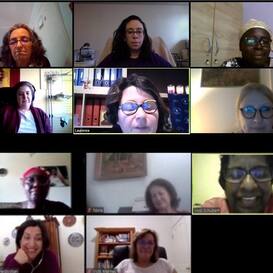 WDPIC Executive Committee WDPIC Executive Committee A new decade started and I was hopeful, but something happened that challenged my hope. I did not see the warning signs of the Coronavirus when it hit Europe during February/March 2020. At the beginning I did not know what was happening and did not realize that the virus was not like the flu I had known before. Europe and the whole world have been in full lockdown. People were asked to stay at home and to leave only for groceries, medicine and potentially to go to work. The world’s economy was greatly impacted and in-person meetings were forbidden to slow down the spread of the Coronavirus. In some European countries, WDP women were not able to celebrate the 2020 program written by WDP Zimbabwe. They did receive the booklets of the 2020 program, so they could have at least an overview and a sense of the Zimbabwe celebration. However, it was not enough and we needed to find ways to communicate differently. As physical distancing became the norm, people started to organise themselves and become creative. How to stay in touch? How to meet as national/regional/local committees? How to start planning for the 2021 Vanuatu program? Most of the European committees are already using social media but at times it does not feel like it is enough and it is too difficult to use. It is at this moment that I discovered the means of videoconferencing, which had been used for the Executive Committee meeting organized by the WDPIC office in New York. In the beginning, I was hesitant but I understood that we need to be innovative. After some tests, most of the WDP women using this means are thankful that they can get in touch again. Yes, we are still here and the movement is still alive! Although videoconferencing may have its limits it is a vital way to stay connected. However, there are limitations that need to be taken into consideration, otherwise some WDP members will be left behind. It may be easy to assume that the problem is aging, but the main issue with online services is connectivity. Depending on where someone lives, internet access and good networks are not always available. Many people still rely on printed materials and physical connections. It is one of the many challenges in the foreseeable future. Social media and communication applications have helped us overcome the feeling of isolation. Through videoconferencing, I realised that we have not yet ran out of all communication possibilities. It is a new exciting journey. As we keep an eye on the pandemic, we also need to make sure no one is left behind on this journey. This pandemic has brought to light that WDP women will always find a way to keep the movement alive, and that we will never give up. We are resilient, we persevere and we rise! Blessings to all and stay safe! - Emmanuelle Bauer, WDPIC Regional Representative of Europe
 Last year while reaping green peas from the kitchen garden, the Holy Spirit spoke to me through a parable. I tried to shake the notion that it was indeed the Holy Spirit, but the stories being poured into my spirit confirmed it, and there was no doubt. I saw in the garden that there were a number of green pea trees of similar height growing in several garden rows, but I was taller than all of them. I could not count the leaves; I could not count the green peas growing on them. The pea pods grow in clusters of varying numbers which were mostly identical in size and color. The color of the peas was green; however, some were red, and some had spots, all in the same pod. There were young pods - the peas not fully developed. There were old pods - the peas that had dried while still on the tree. There were peas with holes caused by worms, still in the pod. There were green leaves, yellow leaves, and dried leaves on the trees, as well as on the ground. There were blossoms on the trees. There were bumble bees feeding at the blossoms. There were spiders casting webs between the leaves and the trees to block the path of the reaper. The webs are traps for the spider’s food and for it to rest, even though they are a bother to me. This garden, full of life, is like us – the children of God. Every aspect of these food bearing trees was given a purpose. “For as in one body we have many members, and not all the members have the same function, so we, who are many, are one body in Christ, and individually we are members, one of another” (Romans 12:4-5) The Spirit showed me individuals in families, in churches, in World Day of Prayer (WDP) groups, in villages, in communities on God’s earth, all with the same beginning. As we all grow, various things happen in our lives which caused us to develop. But the development for each person or family, church, WDP committee, and definitely a village, are different. We have all been given the gifts and promises by God with the opportunities to thrive and to flourish. Yet not everyone thrives and flourishes, or makes it to the ‘pot’. Circumstances cause us to fall or fail. The Holy Spirit taught me through a garden patch of green peas that, the color of our skin, the way we have developed, financially, socially, psychologically or otherwise, does not separate us from God. Even though these things separate us from each other at times, we were all created by the same God who loves us all the same. I did not attend to the pea trees in their infancy. I was not the planter. I did not know them intimately, but God did. The trees grew and the branches touched each other across the garden rows. The Holy Spirit helps us to thrive and flourish in the situation we find ourselves in. Like the bumble bee going from blossom to blossom, the Holy Spirit comes to us to teach us the truth and to guide us. - Rev. Ruth V. E. Phillips, WDPIC Caribbean & North America Regional Representative
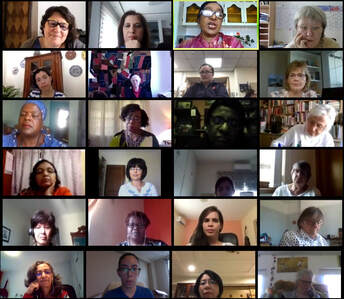 May 27, 2020 - General Meeting May 27, 2020 - General Meeting World Day of Prayer (WDP) is a global ecumenical movement led by women in their communities. It creates an opportunity for building relationships, a spirituality of listening to each other and to God, a prayer informed by the context of women’s lives, and a prayerful action expressed by sharing resources with communities in need. Motivated by a common prayer on the first Friday of March, women lead workshops to learn about the focus country and to study attentively the Bible and the worship service. Together they plan the program for children in schools or churches. The interpretation of the annual theme in the local context and the envisioning of responses are creatively crafted and intensively promoted across the globe. The projects and organizations to support are selected carefully. Most of what we do is based on in-person events where building relationships is the first step of a long journey. However, on March 11, 2020, the World Health Organization (WHO) announced the outbreak of the COVID-19 pandemic. Most of the services planned to be held on the annual day of prayer, March 6th, were held except for in a few countries in Asia and Europe, which were already exposed to the COVID-19 outbreak. WDP Worship Service: The Last In-Person GatheringGovernments around the world set in place measures to reduce the spread of COVID-19, consequently churches and schools were closed for in-person events. Then, WDP activities planned for after March 6th were canceled or postponed, even in Zimbabwe. The committee still nurtures the expectation to hold the National Celebration at the Sports Center in Harare after the lockdown is over and it is safe to gather again, said Sylvia Marowa, “we really want to express our gratitude for the prayers for us from around the world.” In the Cook Islands, the worship service was held with restrictions, and the WDP celebration became the last gathering held in the Cook Islands before the lockdown. “We felt blessed to be able to come together as women of this country to give our thanks to the Lord. The theme is relevant because we have to rise, take up our mats and spread the good news in whatever way we can during the lockdown,” voiced Henrica Marona. The England, Wales and Northern Ireland committee began the Y-Pray Conference in 2016, which “is now held annually in May, to introduce a group of younger women to the movement. The Conference was canceled along with other events, such as Link Days,” informed Elizabeth Burroughs. Manon Naidoo lamented the uncertainty of the well planned 90th Anniversary of WWDP in South Africa to be held during the Africa Regional Conference in October 2020. Taiwan’s experience with the SARS pandemic in 2003, led the government to take early precautions when made aware about the Coronavirus in China. Nancy Lin informed that “the government took over all mask productions and ensured that every single civilian had equal access to buying facial masks. Wearing a mask is required in public transportation and in all indoor public areas such as churches and stores. With masks and keeping social distance, the writing working groups are meeting to develop the worship service program for 2023.” Maral Haidostian, from Lebanon, commented on the difficulties of adopting those precautionary measures for worship services. Listening to Each Other in a Global Conversation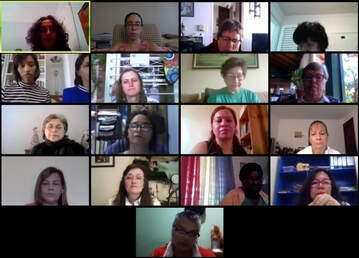 June 12, 2020 - Spanish Speaking Committees June 12, 2020 - Spanish Speaking Committees The WDP International Committee (WDPIC) invited several committees for a global conversation via video conferencing (Zoom) to reflect on the impact of this moment on WDP and the alternatives to move forward. We held four video conferences between May and June - one in Spanish, one in French and two in English. Thirty-nine committees and sixty-three participants from the seven regions joined the conversation, which is summarized in this article. WDP committees are using a variety of tools to keep connected and present to the needs of the communities. They range from rethink the structure and practices to introduce new technologies in communication to reach out to members, friends and local groups. WDP France is considering changing the committee’s structure to reinforce the local connection, stated Christine Méar. “How have we decided to rise, take our mat and walk? We have to reengineer the way in which we do things and seize up this opportunity of involving our regional correspondents, so they can be in contact with their constituents, and linked with the National Committee.” Catherine MacKeil explained that in Canada, they are sorting out WDP grant applications. “With COVID-19, we are unable to support any of the projects with group gatherings, which include a lot of training events. We are focusing on the organizations that are on the frontline of helping people, particularly women touched by violence or human trafficking, and hunger.” Elizabeth Clark, from Australia, pointed out that they do not currently accept direct donation on the website, but to deal with possible reductions in offerings, they may supply transfer details to those interested in contributing that way. Ingrid Mai Pinkes, WDP Argentina, expressed the concern with the currency devaluation on their Annual Contribution to WDPIC. Coromoto Jimenez de Salazar, WDP Venezuela, shared about their committee’s plans to use the offering to provide food to the vulnerable communities in Caracas, although the service could not be held. Keeping the Connection in Times of Social Isolation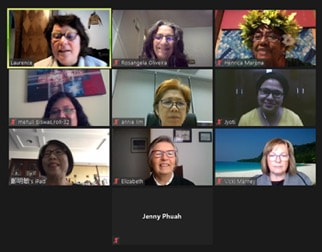 June 17, 2020 - Pacific Region Committees June 17, 2020 - Pacific Region Committees In Germany, the WDP committee is developing a workshop to prepare the facilitators for the Vanuatu 2021 program on an online learning platform (Moodle), explained Irene Tokarski. “We are developing the online platform for our national workshops, which usually happen from June to July, with about 180 women multipliers. We already have responses from most of them. We will have three workshops on the same day as planned instead of the in-person workshops. The digital workshop is a platform where you can do different tasks, for example, research, live chat with other participants, offline tasks like reading the Bible text, or watching a video clip. We will also offer the learning platform for the regional area, because we do not know if we will have another outbreak in autumn.” In Bahamas, the committee asked the young participants for help. The response was so positive that they are planning to have them as the liaison and chairperson mentored by WDP retirees. “Journeying with young women has been a special blessing for us as they have become our teachers in using technology. This inter-generational dialogue has been powerful! Coming out of this crisis, we all realize that a new way forward is necessary. We cannot just ‘make things up as we go along’ and see what will happen. Change, rapid change, unexpected change, is never easy, and not always welcome. But change is inevitable,” said Annette Poitier. Even before the pandemic, WDP committees were using cell phones and instant messaging (WhatsApp, Line) to check on members and friends. Now, they are using instant messaging to send out prayers, remarked Susana Renner, WDP Brazil, or having committee meetings in group chats, shared Berthe Sindjui, WDP Cameroon and Sybille Martial, WDP Republic of Mauritius. As the months advance into the timeline of preparations for the 2021 WDP program, some committees, for the first time, had their regular meeting virtually (Zoom). WDPIC is having monthly video conferences (Zoom) with executive members to replace the canceled annual meeting.  June 20, 2020 - French Speaking Committees June 20, 2020 - French Speaking Committees WDP is increasing its online presence by creating websites and actively using social media platforms (Facebook, Instagram, Twitter). Committees that have not yet made any resources available through their website are considering it, while others plan to expand what they already offer. Social media is used to share the local celebrations, inform about the focus country, post for the Thursdays In Black campaign, and pray for the world. WDPIC posts a prayer on Fridays with the hashtag #WDPUnitedInPrayer. Growing out of the uncertainties of in-person worship services for March 2021 and the current experience with Sunday virtual worship services, many committees are nurturing the possibility of an online service for Vanuatu 2021. Bianka Paz, WDP Guatemala, mentioned their recent conversation about a workshop online with video clips to introduce the materials for the 2021 Vanuatu program. Margarita Cuzco, WDP Paraguay, mentioned their initial conversation about distributing the different moments of the worship service into the communities and finding a virtual space to come together. The Context of Women in the Midst of the PandemicThe vulnerable situation of women during the pandemic was noticed. Families are separated by the lockdown, curfews and closed borders; unemployment, hunger, and domestic violence against women increased. There is shortage of medications and treatments in overflowed public hospitals with COVID-19 patients. In the Democratic Republic of Congo and Brazil, the denial of the health crisis is exposing the population to the uncontrolled virus transmission. In DR Congo, Rose Biasima Lala, commented on their use of local radio to raise awareness about Coronavirus prevention.
Jyothi Singh, WDP India, talked about “the concern with the rural communities who do not have easy access to internet to engage in online initiatives.” Also, in Costa Rica, Rebeca Cascante commented on how the priority is being given to family members who work from home to use the internet rather than women who want to connect with their community activities. WDP has a word of hope to offer There is real pain in the communities with the death of loved ones, an intense feeling of powerlessness to fight the disease and all its consequences. However, there is also strength in being united in prayer. There is trust in God, the sustainer of all times. We lift up in prayers WDP families and communities who are mourning. May God heal our body and soul. It was really inspiring to listen to the efforts made in the midst of so much disruption. WDP leaders are committed to carrying on the message and being present during this difficult moment. We are to walk together in prayer and action. We are to be creative and oriented by the WDP Guiding Principles. WDP has a word of hope to offer. It is time to share it! WDPIC will continue the virtual global conversation to listen to each other, pray for the world, exchange ideas and feel inspired to face the challenges. We may expand on the topics shared by the committees, for example, alternatives to in-person activities, being present to communities in need, and coordinated procedures for online access to WDP materials. The process of developing WDP worship services continues in the midst of the pandemic. The 2021 Vanuatu worship service material is ready and has been electronically distributed. The 2022 worship service program, written by WDP England, Wales and Northern Ireland, will be distributed by September 2020. The writing process with WDP Taiwan for the 2023 service was launched, and we are in conversation with WDP Palestine for the 2024 program. Aware of the uncertainties, but full of hope, we are looking forward to meeting you in 2022, in Scotland, for the International Meeting - “New Heart. New Mind. Called to Hope.” Visit our website for more information and follow our newsletter! The WDP worship service is a tool for listening to each other and God in order to engage in prayer and action with sisters and communities around the world. Together we “Rise, Take our Mat and Walk,” an action oriented message that took us away from the fear inflicted by the pandemic, while the 2021 program written by WDP Vanuatu, will help us affirm the source of our strength to move forward. Together, we “Build on a Strong Foundation” - God’s love and Jesus’ walk on the path of justice. Like the rest of the world, the COVID-19 pandemic has caused immense suffering and confusion in the lives of many people in Asia. A new study by the United Nations World Food Program (WFP) found that lockdowns and the economic recession caused by COVID-19 may exacerbate an already dire worldwide hunger crisis, almost doubling the number of people who could go hungry, pushing a total of 265 million people to the brink of starvation by the end of the year. The COVID-19 pandemic is not merely a global health crisis but also a global humanitarian catastrophe, warned David Beasley, the WFP Executive Director. The various impacts of global warming and climate change resulting in cyclones, flood, locust attacks, earthquakes, and landslides in the midst of this pandemic have further aggravated the suffering in many countries in Asia. Confinement, lockdowns, and quarantines have increased violence against women and children. Measures to curb the disease have worsened existing inequalities, forcing girls out of school and placing them at heightened risk of violence in their homes. Since women and girls undertake more than three-quarters of unpaid care in rural communities in Asia and low-income countries, they are likely to be at greater risk of infection. However, the silver lining in the midst of all this is that there are numerous stories of hope which Asian women are weaving through their dialogue of life.  Garment workers, Bangladesh Garment workers, Bangladesh “True, we were locked in our homes during lock down but COVID-19 does not have the power to lock our hearts filled with compassion and love,” states Daisy Roy (WDP Bangladesh National Correspondent). Daisy Roy, Lipika Florence Sammadar and many other women leaders involved in the WDP in Bangladesh are actively communicating via social platforms and strategizing on how workers in garment factories can be helped during this COVID-19 Emergency Lockdown. Women in Bangladesh are struggling to come to terms with the loss of livelihood as factory workers. They make clothes for European markets, which are laying them off due to mass cancellations of orders. The Bangladesh’s export-oriented garment industry employs more than four million workers and 85 percent of them are women. “Families of garment workers are starving. We are working in partnership with the National Council of Churches in Bangladesh and other interfaith groups to help women factory workers. We are distributing rice, grocery items, food hampers along with soap, sanitizers and personal protective equipment. We are also networking with organizations, federations, and activists who work for the human rights of garment workers,” states Roy. 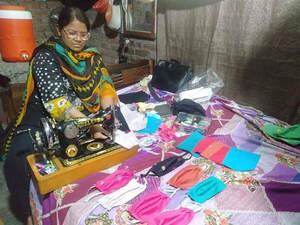 Safety Masks, Pakistan Safety Masks, Pakistan Still reeling under the impact of the coronavirus pandemic, India and Pakistan face a food security situation. “The locust attack in the midst of the COVID-19 pandemic made the situation worse for us in Pakistan. People are dying of hunger and starvation. We are witnessing so much suffering in our own communities. We, women leaders in our churches, started praying and networking to collect whatever food and resources we could to share it with others. We are supporting the families of daily wage laborers, widows, pregnant women etc. We even networked with the Pakistan Army to provide us ration hampers to be distributed. Now we are working to collect health and hygiene materials like vitamins, medicines, sanitary pads and hand sanitizers to be distributed,” says Alyssa Saleem from Pakistan. Saleem is introducing the WDP movement in her Church women’s organization and Diocese. Also from Pakistan, Asyia John is sewing masks for her church women’s fellowship to distribute to the community. “Even if we are poor and vulnerable, we can pray, help and care for one another,” she says. In India, the lockdown hit the migrant workers very hard. Lakhs of migrant workers are reeling in hunger, poverty and find it impossible to reach their homes. Migrants, including women and even children, are walking more than 1000 kms following the railway track or highway trying to get home. Many of them are being hit by lorries or trains in the night. Women are giving birth on the roads, and many are dying of heat stroke and hunger. However, even in the midst of all this suffering, I see rays of hope. These rays of hope are stories of resilience and acts of giving, sharing and kindness which has increased drastically during this COVID-19 crisis. It is not just the privileged and rich who are sharing but even the vulnerable. In different parts of India, women involved in WDP are engaged in humanitarian work by feeding the hungry or supporting those affected by cyclone Amphan, which hit the West Bengal state in India and Bangladesh in May 2020. Women are raising funds to plant trees in the mangrove to restore nature and the livelihood of people in Sundarbans, West Bengal, an area hit by the Cyclone. The mental health of Indian women has become adversely affected by spikes in domestic violence and the stress and anxiety of watching loved ones suffer or die. Women often suffer in a culture of silence. In order to break the silence and care for each other, we have started a WhatsApp group called ‘Food Speaks and Heals’. Cooking can be therapeutic; it can be a cathartic process. This group helps us to connect to one another and share our recipes to boost our immunity. We share our day to day problems, break the silence, care for one another, find solutions and pray together. In Thailand, Rev. Dr. Sirirat Pusurinkham (Former WDPIC Executive Committee member), leads the Prachakittisuk Church, near Chaing Rai, in a community project called ‘Sharing Box’ or ‘Food ATM’. “This project is helping us support people and families, most of whom are undocumented migrants, refugees and economically poor. Jesus has taught us to share our food,” reflects Sirirat. She is also caring for children who have lost their parents to HIV/AIDS and involving the women of her church and community in making masks to distribute during the pandemic. There is so much happiness in giving and sharing in the midst of crisis. Giving and sharing is an act of hope as it heals the wounded and suffering world. Christ has bestowed us the power of resilience, so even if we are vulnerable, we can “Rise, Take Our Mat and Walk” and journey together in healing the world. - Rev. Moumita Biswas, Asia Regional Representative of WDPIC Executive Committee
On behalf of WDPIC, we invite WDP National/Regional Committees to the International Committee Meeting that will be hosted by the WDP Scottish Committee in 2022. They are actively preparing to welcome us to their homeland. Thank you, sisters! We live in unprecedented times and are all working together to slow down the transmission of the Coronavirus (COVID-19) in our communities. We may have unanswered questions at this time and discomforting prospects for the future, but our trust is in God’s goodness. Let us, therefore, “Rise, Take Our Mat and Walk”. In 1968, the World Day of Prayer International Committee was formed. We left the last International Meeting, held in Foz do Iguaçu, Brazil, in 2017, knowing that we would meet again for the 14th time in 2022. With this Newsletter we are inviting you to envision together this next gathering. At the top of the Newsletter, you see the logo for the Meeting, which was a collaborative effort with the Presbyterian Women (PC-USA). The leaf of hope, which encircles WDP, springs out in a dancing movement towards a new heart and mind. With the uplifting message about the intention of the gathering, comes the announcement of the date and location of the International Meeting. Click here to let us know how the 2022 International Meeting logo speaks to you. SAVE THE DATE: JUNE 12-19, 2022 LOCATION: EDINBURGH, SCOTLAND REGISTRATION AND ACCOMMODATION FEES WILL BE ANNOUNCED SOON The purpose of the World Day of Prayer International Committee Meeting The World Day of Prayer International Committee is composed by the WDP National Committees elected delegates, who come together to share experiences and grow in understanding of one another. They also select themes and writers for WDP services, elect an ecumenical Executive Committee, define objectives and responsibilities for financing, and consider ways by which the movement may grow. Click here to send us your questions about the 2022 International Meeting. “New Heart, New Mind, Called to Hope” Based on the letter to Ephesians (1,18), we are called to hope; therefore, We invite you to experience the meeting with a spirit of openness and tolerance, and for that, the heart must be ready: New Heart! We invite you to discern together the challenges of our time and make wise, visionary and courageous decisions: New Mind! Above all, we want to reaffirm that the women of World Day of Prayer are carriers and givers of hope: Called to Hope! Will you join us on the path of “New Heart, New Mind. Called to Hope”? Click here to share your thoughts about the 2022 International Meeting theme. - Laurence Gangloff, WDPIC Chairperson 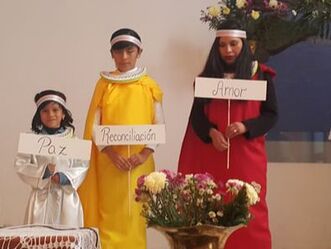 WDP 2020 Celebration, Mexico WDP 2020 Celebration, Mexico En América Latina, la pandemia del Covid-19 ha tenido impactos diferentes. Se hace difícil la comunicación pues muchas de las mujeres no tienen acceso a las redes sociales, la calidad del servicio de internet es mala, o en sus casas están los familiares trabajando que tienen prioridad en el uso del servicio de internet. La pandemia afecta mucho a las mujeres trabajadoras por el hecho de estar la mayoría dentro del sector laboral informal. Al quedarse en casa, no poden acceder al recurso de su sobrevivencia. Además el desempleo ha aumentado, haciendo que sus esposos desempleados o los padres de sus hijos no les dan la pensión alimenticia. Hay más miedo a morir de hambre que del COVID -19! Hay crecido el nivel de estrés de las mujeres que están atendiendo a toda la familia en cuarentena, con los niños pidiendo lo que no se les puede dar (comida) y maridos estresados aumentando el riesgo de violencia. Las mujeres están sin poder salir a denunciar por miedo al contagio. Esto es un común en la región, por lo que se de en Nicaragua, Guatemala; el Salvador, Honduras y México. La impotencia al no poder ayudar se experimenta en muchos niveles, incluso ante las políticas de la mayoría de los gobiernos en Latinoamérica, que priorizan los intereses políticos a la vida y las necesidades de los más vulnerables. Es en estos momentos donde las palabras de Jesús en Juan 5: 6 - "quieres ser sano" - toman un significado relevante. Las acciones de la gente y el amor a la vida requieren del coraje para levantarse y tomar medidas que transformen el dolor, la muerte, y la impotencia en esperanza, alegría, rencuentro, salud, sanidad y fe. Deseo y pido a Dios, que cada cual encuentre la sabiduría para responder y hacer lo que se necesita en cada situación para transmitir esperanza, y confiar en la fidelidad de Dios, que nos permitirá salir de esto momento. Que Dios nos ayude. Amen. -Rebeca Cascante, Representante de Latinoamerica en el
Comité Internacional del Día Mundial de Oración |
Archives
April 2025
Categories
All
|
|
Home Image: Yoruba dancers at the World Yoruba Carnival of Arts and Culture festival ©Creative Commons Attribution-Share Alike 4.0 International
|




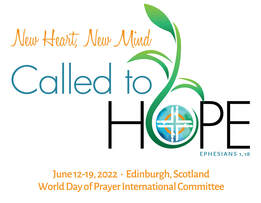
 RSS Feed
RSS Feed